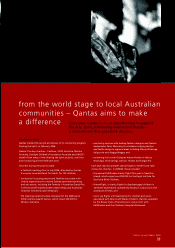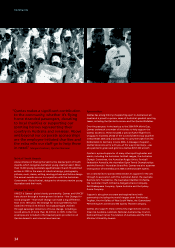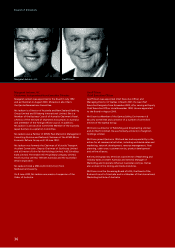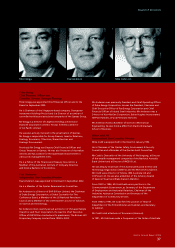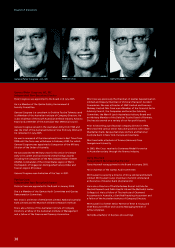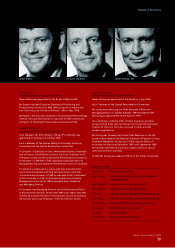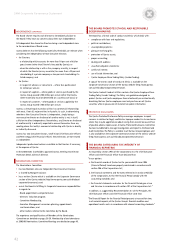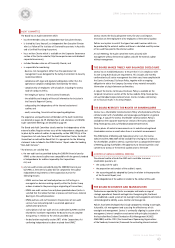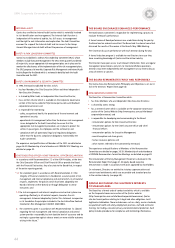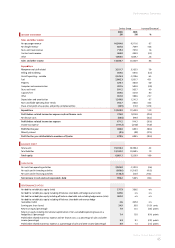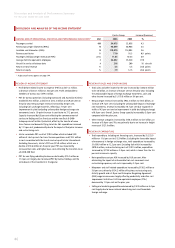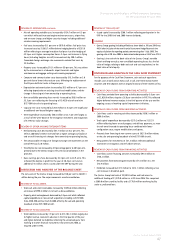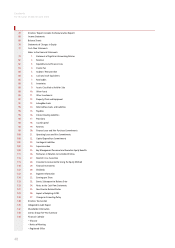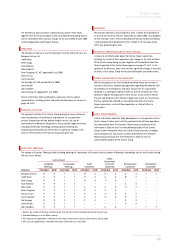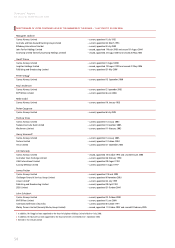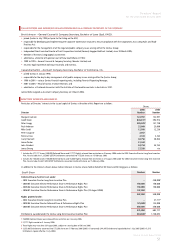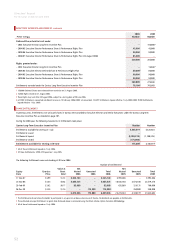Qantas 2006 Annual Report Download - page 44
Download and view the complete annual report
Please find page 44 of the 2006 Qantas annual report below. You can navigate through the pages in the report by either clicking on the pages listed below, or by using the keyword search tool below to find specific information within the annual report.
42
2006 Corporate Governance Statement
INDEPENDENCE CONTINUED
The Board Charter requires each Director to immediately disclose to
the Board if they have any concerns about their own independence.
All Independent Non-Executive Directors bring a real independent view
to the consideration of Board issues.
Qantas believes that the following materiality thresholds are relevant when
considering the independence of Non-Executive Directors:
• for Directors:
•
a relationship which accounts for more than 10 per cent of his/her
gross income (other than Director’s fees paid by Qantas); or
•
when the relationship is with a firm, company or entity, in respect
of which the Director (or any associate) has more than a 20 per cent
shareholding if a private company or two per cent shareholding if a
listed company; and
• for Qantas:
•
in respect of advisers or consultants – where fees paid exceed
$2 million per annum;
•
in respect of suppliers – where goods or services purchased by the
Qantas Group exceed $100 million per annum (other than banks,
where materiality must be determined on a case-by-case basis); or
•
in respect of customers – where goods or services supplied by the
Qantas Group exceed $100 million per annum.
Qantas, as the principal Australian airline, has commercial relationships
with most, if not all, major entities in Australia. As such, in determining
whether a Non-Executive Director is independent, simply being a
non-executive director on the board of another entity is not, in itself,
sufficient to affect independence. Nevertheless, any Director on the board
of another entity is ordinarily expected to excuse themselves from any
meeting where that entity’s commercial relationship with Qantas is directly
or indirectly discussed.
Qantas has two Executive Directors, Geoff Dixon (Chief Executive Officer)
and Peter Gregg (Chief Financial Officer). These Directors are not treated
as independent.
Independent professional advice is available to the Directors if necessary,
at the expense of Qantas.
At the 2000 AGM, shareholders approved Qantas entering into Director
Protection Deeds with each Director.
NOMINATIONS COMMITTEE
The Nominations Committee:
• has two Members who are Independent Non-Executive Directors;
• is chaired by Margaret Jackson;
• has a written Charter which is available on the Corporate Governance
section of the Qantas website (http://www.qantas.com.au/info/about/
corporateGovernance); and
• assists the Board in fulfilling its Corporate Governance responsibilities
in regards to:
•
Board appointments and performance;
•
Directors’ induction program;
•
Committee Membership;
•
Executive Management succession planning, appointments
and terminations; and
•
other matters referred to the Committee by the Board.
The experience and qualifications of Members of the Nominations
Committee are detailed on pages 36-39. Membership of and attendance
at 2005/06 Nominations Committee Meetings are detailed on page 49.
THE BOARD PROMOTES ETHICAL AND RESPONSIBLE
DECISION-MAKING
The Board has a formal code of conduct and ethics which deals with:
• compliance with laws and regulations;
• political contributions;
• unacceptable payments;
• giving or receiving gifts;
• protection of Qantas assets;
• proper accounting;
• dealing with auditors;
• unauthorised public statements;
• conflict of interest;
• use of inside information; and
• Qantas Employee Share Trading Policy (Insider Trading).
A copy of the Qantas Code of Conduct & Ethics is available on the
Corporate Governance section of the Qantas website (http://www.qantas.
com.au/info/about/corporateGovernance).
The Qantas Code of Conduct & Ethics contains the Qantas Employee Share
Trading Policy (Insider Trading). The Policy sets guidelines designed to
protect Qantas and Qantas employees from intentionally or unintentionally
breaching the law. Qantas employees must not purchase or sell Qantas
securities while in possession of material non-public information.
PROTECTED DISCLOSURES
The Qantas Protected Disclosures Policy encourages employees to report
concerns in relation to illegal, unethical or improper conduct in circumstances
where they may be apprehensive about raising their concern because of fear
of possible adverse repercussion. A Qantas Protected Disclosures Committee
has been established to manage investigations and report to the Board and
Audit Committee. The Policy is available to all Qantas Group employees and
is also available on the Corporate Governance section of the Qantas website
(http://www.qantas.com.au/info/about/corporateGovernance).
THE BOARD SAFEGUARDS THE INTEGRITY OF
FINANCIAL REPORTING
As required by section 295A of the Corporations Act, the Chief Executive
Officer and Chief Financial Officer have declared that:
“In our opinion:
a. the financial records of Qantas for the year ended 30 June 2006
(Financial Period) have been properly maintained in accordance with
section 286 of the Corporations Act;
b. the financial statements and the notes referred to in section 295(3)(b)
of the Corporations Act for the Financial Period comply with the
accounting standards; and
c. the financial statements and notes for the Financial Period give a true
and fair view in accordance with section 297 of the Corporations Act.”
In addition, as suggested by Recommendation 4.1 of the Principles, the
Chief Executive Officer and Chief Financial Officer state that:
“The Financial Report for the Financial Period presents a true and fair view,
in all material respects, of the Qantas Group’s fi nancial condition and
operational results and is in accordance with relevant accounting standards.”



